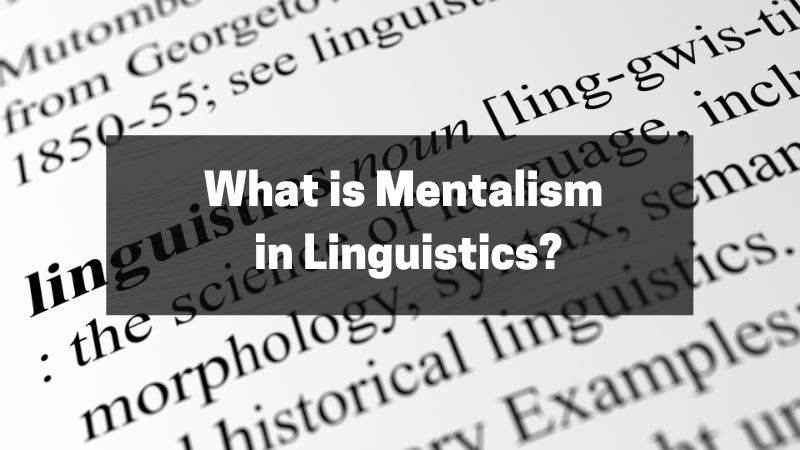The word “mentalism” is something we often associate with magic tricks, psychic readings, and stage hypnosis.
But did you know that it’s also part of important theories in linguistics?
Yes, mentalism is used outside of your usual magic shows and has a completely different meaning and application.
Today, we’re going to talk about mentalism in linguistics and how it differs from mentalism magic.
We’ll also briefly touch on mentalism theories in linguistics and how experts think these affect humans as a whole.
So let’s show you what is mentalism in linguistics…
What is Mentalism in Linguistics?
Mentalism in linguistics views language as a mental phenomenon.
The study of language should focus on the cognitive processes involved in language production and comprehension.
This idea highlights the importance of understanding how the brain creates and uses mental representations of sounds, words, and grammar rules to communicate.
These mental representations include phonemes (the smallest units of sound in language), words, and grammatical rules.
It’s all very complicated.
But basically, mentalism in linguistics emphasizes the importance of understanding how these mental representations are formed, stored, and used in language processing and production.
Mentalism in Linguistics vs. Mentalism in Magic
It’s important to distinguish mentalism in linguistics from mentalism in magic, as the two are often confused.
So let’s take a closer look.
Mentalism In Magic
Mentalism in magic is a performance art that involves using psychological techniques and stagecraft to create the illusion of reading minds, predicting the future, or performing other seemingly supernatural feats.
For example, a mentalist will call on a member of their audience and asks them to think of a symbol, letter, color, etc.
While doing this, the mentalist will give prompts to somewhat manipulate what their participant will think about in order to get their desired answer.
Finally, the mentalist will reveal that they had known all along what the participant was thinking.
This often results in audiences believing that this mentalist has some sort of supernatural ability to read minds or predict the future.
However, the truth is that the mentalist simply made use of the same psychological principles as mentalism in linguistics.
Through words, he convinced the audience member to choose the answer he wanted.
Mentalism in Linguistics
Mentalism in linguistics, on the other hand, is an academic discipline that seeks to understand the cognitive processes involved in language use.
It’s a very deep study of the mind and language.
A good example of mentalism in linguistics would have to be Noam Chomsky’s Theory of Language.
In Noam Chomsky’s Theory of Language, Chomsky believes that humans have an innate ability to learn and understand language.
He holds that the human brain has a “language acquisition device” that, when used with a set of Universal Grammar rules or principles, enables people to produce an endless number of sentences.
Chomsky contends that this fundamental capacity for language learning is what distinguishes humans from other animals and explains why young infants pick up new languages so quickly and easily.
The study of language, according to Chomsky’s idea, should concentrate on the mental processes involved in language learning and use rather than only the overt behavior of language users.
There are also other studies that demonstrate the use of mentalism in linguistics such as:
- Steven Pinker’s “The Language Instinct”. Pinker explores the idea of language as an innate and biological phenomenon, rooted in mental structures.
- Michael Tomasello’s “Constructing a Language: A Usage-Based Theory of Language Acquisition”. He discusses a usage-based approach to language acquisition that takes into account the cognitive and social aspects of language learning.
- Jean Aitchison’s “The Articulate Mammal: An Introduction to Psycholinguistics”. This provides an overview of psycholinguistics and studies the relationship between language and the mind.
Now, whether we agree with Chomsky, Pinker, Tomasello, or Aitchison is not the point of this article.
We are simply here to highlight how these theories make use of mentalism in the field of linguistics and academics.
The Importance of Mentalism in Linguistics
Reading lengthy articles, e-books, and textbooks about mentalism in linguistics can seem like such a drag. But it is important that we have some knowledge about how our languages came to be.
Mentalism in linguistics has greatly impacted the study of language by emphasizing the cognitive aspects of how languages were created and how it is being used up to this day.
Through theories and models, linguists have been able to explain language disorders, variations, and acquisition.
Mentalism in linguistics has highlighted the importance of mental representations in language processing and production.
By studying cognitive processes involved in language use, such as perception, attention, and memory, linguists have uncovered the mechanisms that underlie our ability to understand and use language.
Overall, mentalism in linguistics has led to a more nuanced understanding of language as a mental process. And for that, we should see the importance of mentalism in linguistics.
Conclusion
In summary, mentalism in linguistics focuses on how mental structures and processes influence language processing and production.
This approach to linguistics has led to the development of many theories and models that emphasize the cognitive aspects of language use and acquisition.
Yes, mentalism in linguistics has had a substantial impact on the field of linguistics and has provided valuable insights to researchers around the world.
So know that mentalism is not only about performing mind-reading, physic, and hypnosis tricks.
There is a deeper study to it.
And for mentalism in linguistics, this has to do with all things language and the mind.
Of course, the whole topic is a bit overwhelming.
But if you dive deeper into it, you’ll see just how powerful mentalism in linguistics can be.
For now, we just gave you a teaser about it.
You can either use this to know a bit more about what is mentalism in linguistics — or you can use it to create your own theories about language.
Just know this — mentalism in linguistics is so different from mentalism in magic. Never confuse the two.

